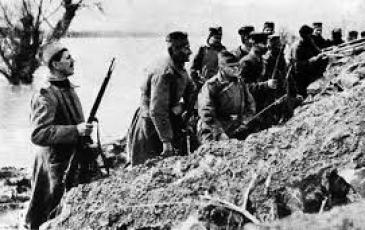1914_1114_01: "Zabogom!" - FWWC 03 Serbia '14

 0 - 0 - 0
0 - 0 - 0

| Rating: | 0 (0) |
| Games Played: | 0 |
| SM: | 3 |
| Turns: | 16 |
| Type: | Stock |
| First Side: | Central Powers |
| Second Side: | Allied Powers |
Valjevo, Serbia, 13th November 1914:
In the initial phase of the third invasion of Serbia, the Austro-Hungarians once again planned on capturing Valjevo, a key road junction in western Serbia. Unlike the other two invasions before it, the Austro-Hungarians deployed a large force on the upper Drina with intent on striking a direct blow to Valjevo, via Ljubovija and Pecka. The plan was to push the Serbians hard in the front, and break into their left flank and swing around behind. At the very least this plan would either roll up the Serbian main line, or force the ground west of Valjevo to be untenable.
As the attack commenced, the Serbians were forced to withdraw from their forward positions as the Austro-Hungarians had planned and fell back on Valjevo, determined to defend it and even planned for a counter offensive. However this offensive was soon cancelled after reality began to sink in and Serbian high command ordered all armies to hold their ground and to only withdraw if absolutely necessary.
When the Austro-Hungarians advanced, the Serbian 1. and 3. Army were forced to give way, fighting a delaying action that fell back on Valjevo. Field Marshall Stepanovic, commander of the Serbian 2. Army, grew increasingly worried about the situation since his forces were holding the flank; if they could not hold then the Austro-Hungarians could cut off the 1. and 3. Army, but if they also did not withdraw soon then they would certainly be shattered. When Stepanovic phoned high command, he was informed that he should hold and coordinate his withdrawal with 3. Army, to which Stepanovic replied that there was nothing that could be agreed upon. Field Marshal Putnik, the Serbian Army's supreme commander, broke off the telephone conversation with a "zobogom!" ("good-bye!") as the receiver was slammed down on the other end. There was nothing to discuss; the three Serbian army commanders would have to work together to survive and somehow also delay the enemy's unstoppable advance long enough so that all Serbian armies could escape behind the Kolubara River.
[Size: large]
*See the notes document for information on scenario design decisions and historical notes.
In the initial phase of the third invasion of Serbia, the Austro-Hungarians once again planned on capturing Valjevo, a key road junction in western Serbia. Unlike the other two invasions before it, the Austro-Hungarians deployed a large force on the upper Drina with intent on striking a direct blow to Valjevo, via Ljubovija and Pecka. The plan was to push the Serbians hard in the front, and break into their left flank and swing around behind. At the very least this plan would either roll up the Serbian main line, or force the ground west of Valjevo to be untenable.
As the attack commenced, the Serbians were forced to withdraw from their forward positions as the Austro-Hungarians had planned and fell back on Valjevo, determined to defend it and even planned for a counter offensive. However this offensive was soon cancelled after reality began to sink in and Serbian high command ordered all armies to hold their ground and to only withdraw if absolutely necessary.
When the Austro-Hungarians advanced, the Serbian 1. and 3. Army were forced to give way, fighting a delaying action that fell back on Valjevo. Field Marshall Stepanovic, commander of the Serbian 2. Army, grew increasingly worried about the situation since his forces were holding the flank; if they could not hold then the Austro-Hungarians could cut off the 1. and 3. Army, but if they also did not withdraw soon then they would certainly be shattered. When Stepanovic phoned high command, he was informed that he should hold and coordinate his withdrawal with 3. Army, to which Stepanovic replied that there was nothing that could be agreed upon. Field Marshal Putnik, the Serbian Army's supreme commander, broke off the telephone conversation with a "zobogom!" ("good-bye!") as the receiver was slammed down on the other end. There was nothing to discuss; the three Serbian army commanders would have to work together to survive and somehow also delay the enemy's unstoppable advance long enough so that all Serbian armies could escape behind the Kolubara River.
[Size: large]
*See the notes document for information on scenario design decisions and historical notes.





















